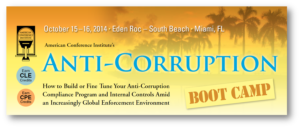View all upcoming Anti-Corruption/FCPA events around the world, click here.
Category: Anti-Corruption / FCPA, Legal Conferences, Litigation, Regulatory & Compliance
Argentine Authorities React to a New FCPA Case
-
Expert article by Pedro Serrano Espelta and Gustavo Luis Morales Oliver. Originally published on marval.com.ar in June 2013. Republished with the permission of Pedro Serrano Espelta.
The suspension of the tax ID number is a new element in anti-corruption cases in Argentina and by itself could send a company out of business since a company would be incapable of issuing invoices and making filings with the tax authorities.
International Trade & Customs
On April 18, 2013, Ralph Lauren Corporation entered into a Non-Prosecution Agreement (the “Agreement”) with the Securities and Exchange Commission and the Department of Justice regarding inappropriate conduct occurred during 2005 through 2009 in Argentina, which is sanctioned under the US Foreign Corrupt Practices Act (“FCPA”). According to the Agreement, such conduct included paying approximately USD 568,000 to Customs brokers as reimbursement of expenses. However, the money was used to bribe Customs officials to permit clearance of items without the necessary paperwork, to permit the clearance of prohibited goods and to avoid inspection of products. This was the first Non-Prosecution Agreement in the history of FCPA, a regulation enacted in 1977. Upon public disclosure of the Agreement in the media, the Argentine authorities decided to initiate investigations to sanction all corrupt actions that may have occurred in Argentina in connection with the facts disclosed by Ralph Lauren to enter into the Agreement. The Director of the Argentine Federal Tax Agency (“AFIP”), which involves the Tax Revenue Agency and Customs, requested the criminal Courts to start a criminal investigation. Additionally, the AFIP suspended the tax ID number of the company and the directors involved, and requested the US Ambassador to provide all information available about corrupt actions in Argentina regarding the Agreement. According to the press, the US Embassy in Buenos Aires informally stated that they are willing to cooperate with the Argentine authorities under the framework set forth by the Mutual Legal Assistance Treaty executed by both countries in the 1990s. The suspension of the tax ID number is a new element in anti-corruption cases in Argentina and by itself could send a company out of business since a company would be incapable of issuing invoices and making filings with the tax authorities. Despite the fact that suspensions of the tax ID number are being challenged with the Courts as unconstitutional, this sanction is a new element to consider in anti-corruption cases, especially those involving voluntary disclosure abroad of corrupt acts that occurred in Argentina. In the past, contingencies of corrupt acts in Argentina emphasized individuals (e.g. directors and managers, and individuals who actually committed or collaborated in corrupt practices). However, more recently the suspension of the tax ID number and a policy of recovery of the assets earned as a consequence of corrupt acts, place emphasis on companies as well (in addition to the always present reputational cost of corruption). Altogether, both sanctions imposed abroad and locally show the increasing relevance of up-to-date compliance programs for companies doing business in Argentina, especially if they are subject to foreign anti-corruption law. The design of a full scope compliance program should consider local anticorruption regulation, foreign anticorruption regulation (if applicable), the culture of the company and the business culture of both the foreign and the local jurisdictions involved. However, if the program is not properly embedded in the day-to-day operations of the company, its effectiveness will be severely reduced.
Pedro will speak at ACI’s Inaugural Miami Anti-Corruption Boot Camp, October 15-16, 2014:
What’s Happening in the LATAM Region? Detecting Recent Corruption Schemes in Brazil, Venezuela, Colombia, Argentina, and Mexico
To learn more about the event click on the image below:
